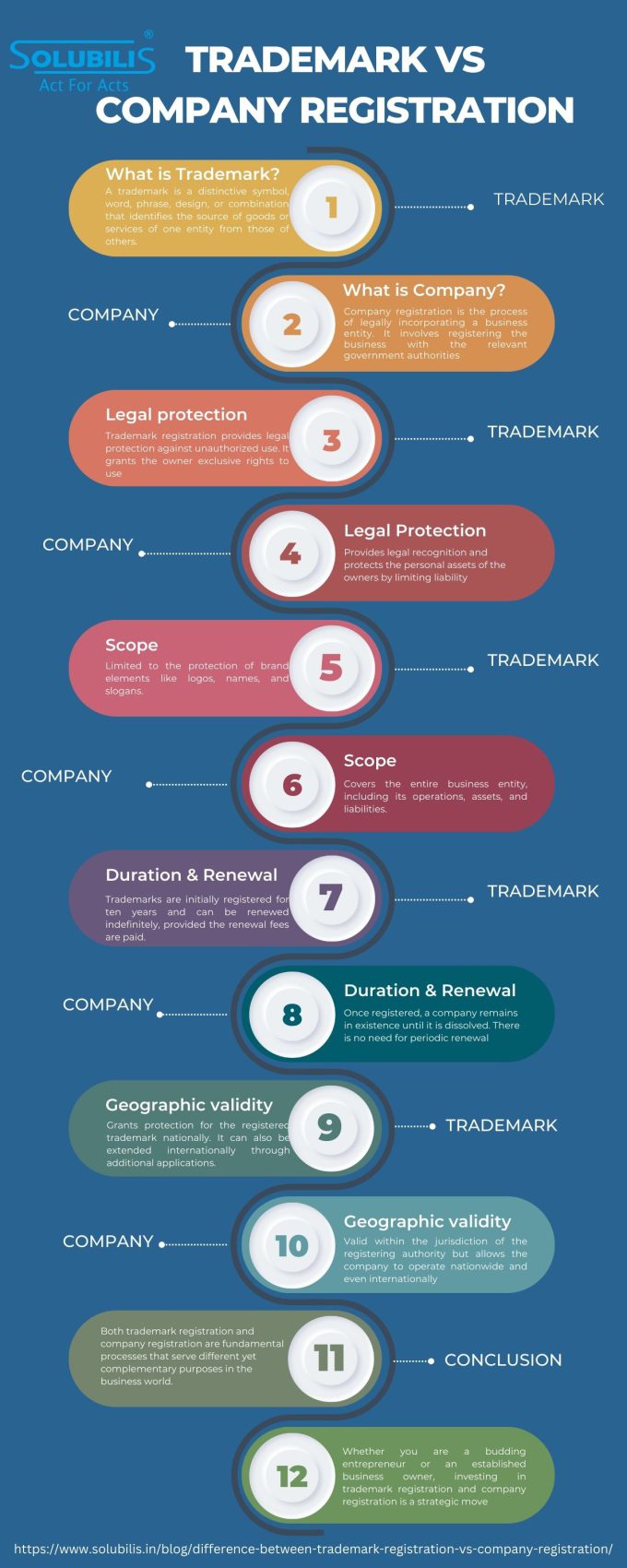Difference between Trademark Registration vs Company Registration

In the dynamic world of business, protecting intellectual property and ensuring legal compliance are crucial for any venture. Two significant legal processes that every entrepreneur should understand are trademark registration and company registration. While both serve distinct purposes. And they are confused very often. This blog aims to demystify these processes, focusing particularly on Trademark registration in Bangalore and company registration in Bangalore.
What is a Trademark?
A trademark is a distinctive symbol, word, phrase, design, or combination thereof that identifies and sets apart the source of goods or services of one entity from those of others. It acts as a brand identifier, helping consumers recognize and choose products or services based on their experience and expectations.
Importance of Trademark Registration
Brand Recognition: Trademark registration in Bangalore boosts brand recognition and fosters consumer trust. It signifies that the brand is established and committed to maintaining its quality.
Asset Creation: A trademark can become a valuable asset over time, contributing to the brand’s overall value. It can be sold, licensed. Also, Trademark can be used as security for loans.
Nationwide Validity: Registered trademarks get protection nationwide, regardless of the scale of the business. This is particularly crucial for businesses planning to expand.
Process of Trademark Registration in Bangalore
- Trademark Search: Conduct a thorough search to ensure the proposed trademark is unique and not already registered. This step helps avoid potential conflicts and legal issues.
- Filing Application: Submit the trademark application with the required details, including the applicant’s name, logo, and description of goods or services. The application can get online filing or through a physical submission.
- Examination: The trademark office examines the application to ensure compliance with regulations. This involves checking for similarity with existing trademarks and adherence to legal requirements.
- Publication: If the application passes the examination, it is published in the trademark journal. This allows third parties to oppose the registration if they have valid reasons.
- Registration: If no opposition is filed within the stipulated period, or if the opposition is resolved in favour of the applicant, the trademark is registered, and a registration certificate is issued.
What is Company Registration?
Company registration in Bangalore is the process of legally incorporating a business entity. It involves registering the business with the relevant government authorities, thus granting it a legal identity separate from its owners. This legal entity can engage in business activities, own assets, and incur liabilities in its name.
Types of Company Structures in India
- Private Limited Company: This is the most common type of business entity in India It restricts shareholders’ liability to their shareholding and limits the transferability of shares.
- Public Limited Company: This type of entity can publicly offer its shares and has fewer restrictions on share transferability. The registration requires a minimum of seven shareholders.
- One Person Company (OPC): An OPC is suitable for single entrepreneurs who wish to enjoy the benefits of a corporate entity while retaining full control.
- Limited Liability Partnership (LLP): An LLP combines the benefits of a partnership and a company, offering limited liability protection to its partners.

Process of Private Limited Company Registration in Bangalore
- Digital Signature Certificate (DSC): Obtain DSCs for the proposed directors of the company. This is necessary for filing electronic documents with the Registrar of Companies (RoC).
- Director Identification Number (DIN): Obtain DINs for the proposed directors. A DIN is a unique identification number necessary for directors of Indian companies.
- Name Approval: Choose a unique name for the company and apply for name approval with the Ministry of Corporate Affairs (MCA). The name should not be identical or similar to existing companies or trademarks.
- Incorporation Documents: Prepare and file the incorporation documents, including the Memorandum of Association (MoA) and Articles of Association (AoA). These documents define the company’s constitution and scope of activities.
- Company Registration: Once the documents are verified and approved, the RoC issues a Certificate of Incorporation (CoI), officially registering the company. The company can then commence business activities.
Trademark Registration vs. Company Registration: Key Differences
Purpose
- Trademark Registration in Bangalore: Primarily focuses on protecting the brand identity of products or services. It ensures that the unique features of the brand have legal protection from unauthorized use.
- Company Registration: Establishes the business as a legal entity. It provides a structured framework for business operations, liability management, and compliance with regulatory requirements.
Legal Protection
- Trademark Registration: Offers protection against infringement, ensuring that no other entity can use the registered trademark for similar goods or services.
- Company Registration: Provides legal recognition and protects the personal assets of the owners by limiting liability to the extent of their investment in the company.
Scope
- Trademark Registration: Limited to the protection of brand elements like logos, names, and slogans. It does not confer any legal rights concerning the business entity or its operations.
- Company Registration in Bangalore: Covers the entire business entity, including its operations, assets, and liabilities. It defines the legal framework within which the business operates.
Duration and Renewal
- Trademark Registration: Trademarks are initially registered for ten years and can be renewed indefinitely, provided the renewal fees are paid.
- Company Registration: Once registered, a company remains in existence until it is dissolved. There is no need for periodic renewal, but regular compliance and reporting are required.
Geographic Validity
- Trademark Registration: Grants protection for the registered trademark nationally. It can also gets extension internationally through additional applications.
- Company Registration: Valid within the jurisdiction of the registering authority but allows the company to operate nationwide and even internationally, subject to compliance with relevant regulations.
Conclusion
Both trademark registration and company registration are fundamental processes that serve different yet complementary purposes in the business world. Trademark registration in Bangalore ensures that your brand gets protection from unauthorized use, enhancing its value and recognition. On the other hand, private limited company registration in Bangalore provides a legal identity to your business, facilitating smooth operations, compliance, and growth.
For entrepreneurs and businesses in Bangalore, understanding these processes and leveraging them effectively can lead to a strong, legally protected, and well-structured business foundation. Whether you are a budding entrepreneur or an established business owner, investing in trademark registration and company registration is a strategic move that can safeguard your interests and pave the way for future success.

